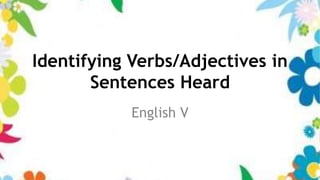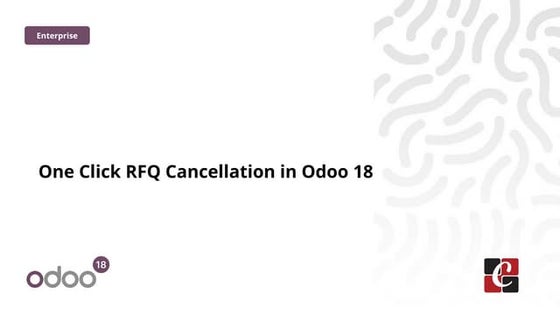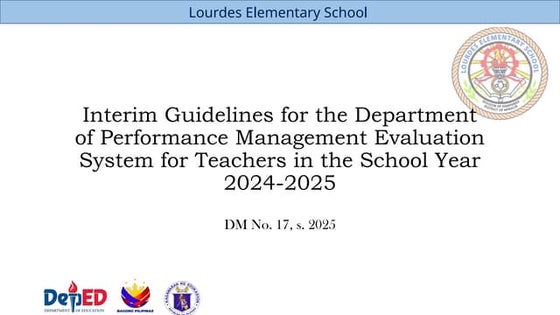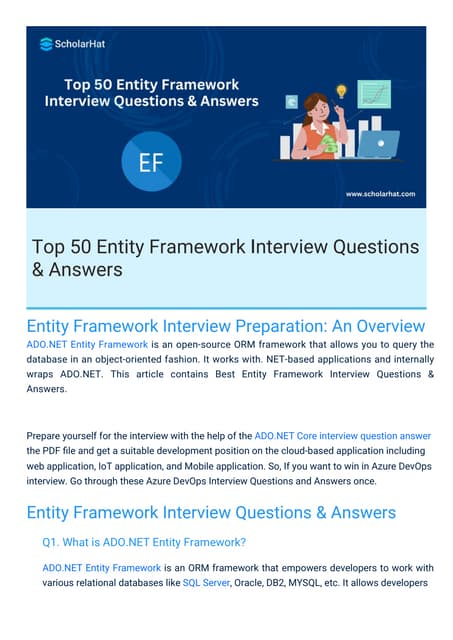3rd Qtr 1 identifying verbs and adjectives
Download as PPTX, PDF1 like456 views
1. The passage describes a dialogue between Justin and his father about the early Filipinos. 2. Justin initially thought the early Filipinos were lazy because they lived in caves instead of houses, but his father corrected him, saying they had a simple yet hard way of life. 3. Justin's father explained that the early Filipinos hunted wild animals with bows and arrows or spears for food, and sometimes ate raw meat, showing their life was difficult compared to modern times.
1 of 14
Downloaded 18 times














Recommended
Nouns hyperlink



Nouns hyperlinkellasntgo_
Ěý
This document appears to be an activity that tests the ability to identify different types of nouns. It contains 10 multiple choice questions asking the user to identify nouns as common, proper, abstract, collective, countable, uncountable, or concrete. For each question answered correctly, the user is prompted to the next question, while incorrect answers result in a message to try again.Verb to be



Verb to beAytum Hernández Hamón
Ěý
The document discusses the uses of the verbs "ser" and "estar" in Spanish. It lists the main uses which include identification, origin, description, occupation, location, time/date, material/purpose, and states of being. It provides examples of affirmative, negative, and interrogative sentences using common contractions of "ser" and "estar" verbs like "I'm", "you're", "he's", etc. It notes that the indefinite article "a" is only used with occupations when referring to a single person.The simple past



The simple pastIngles Corporativo
Ěý
The document provides information about the simple past tense in English. It discusses using regular and irregular verbs in the past tense. It also covers forming negative and yes/no questions in the past tense. The document uses examples from the life of Wangari Maathai, a Kenyan environmentalist and Nobel Peace Prize laureate, to illustrate using the simple past tense. It provides exercises for learners to practice forming sentences and questions in the past tense.3b



3bCarla Sofia Feteira
Ěý
This document contains an English test with multiple choice, fill-in-the-blank, and matching questions about a girl named Caroline. The test examines reading comprehension and tests knowledge of basic grammar through questions about Caroline's daily routine, where she lives, her schooling situation, and her help on a family farm.Pg5 final mock exam



Pg5 final mock exampilisol
Ěý
The document is a practice exam for grammar and vocabulary. It contains multiple choice questions testing verb tenses and forms, vocabulary like adjectives and synonyms, and completing sentences with the correct verbs. There are also exercises on transforming sentences to have the same meaning using words provided in parentheses like "used to" or connecting words like "unless". The practice exam covers a wide range of fundamental English grammar and language concepts.Pg 5 midterm mock exam ef



Pg 5 midterm mock exam efpilisol
Ěý
The document is a mock exam for a midterm test covering grammar and vocabulary. It contains multiple choice questions testing parts of speech, verb tenses, prepositions, and vocabulary. It also includes exercises to identify errors and complete dialogues. The mock exam provides practice with essential grammar and language skills.Prova de reclassificação do1º ano respostas



Prova de reclassificação do1º ano respostasAlexandra Penido
Ěý
1. Steve and Stella Baker live in California. Stella has a good job as an electronics engineer for the US Navy, so she works while Steve stays home to look after their two small children.
2. Jim Macartney is a British helicopter pilot who lives and works in Africa, transporting doctors and nurses to remote jungle areas with no roads.
3. Mrs. Betty Brown is a 62-year-old housewife, grandmother, and student in Oxford, England who studies Japanese and is top of her class. Her son who lives in Japan sends her Japanese learning materials.K TO 12 GRADE 3 IKA-APAT na Markahang Pagsusulit



K TO 12 GRADE 3 IKA-APAT na Markahang PagsusulitLiGhT ArOhL
Ěý
A compilation of Fourth Grading Examination for Grade3cot 1 2019 ppt.pptx



cot 1 2019 ppt.pptxNiendaJabilles1
Ěý
This document provides a lesson on concrete and abstract nouns. It defines concrete nouns as nouns that can be seen, heard, smelled, tasted or felt, giving examples like "cat", "bird", and "stone". Abstract nouns are defined as nouns that show virtues, traits, characters, or qualities that cannot be seen, heard, smelled, tasted, or touched, giving examples like "peace" and "happiness". The document provides exercises to identify concrete and abstract nouns in sentences and determine whether underlined words are concrete or abstract nouns. It concludes with assigning group activities involving concrete and abstract nouns and evaluating understanding of what these nouns are.Active and Passive Voice 2020 Day 2.pptx



Active and Passive Voice 2020 Day 2.pptxlaytzjhay
Ěý
The document provides guidance and learning tasks on active and passive voice. It begins with friendly reminders for learning and then presents examples of sentences written in both active and passive voice using different verb tenses. Learners are asked to identify whether sentences are active or passive voice and then to practice converting sentences between the two voices.Bing 8 chapter 7 my uncle is a zookeeper



Bing 8 chapter 7 my uncle is a zookeeperSMPK Stella Maris
Ěý
This document contains information about a class learning English. It discusses a field trip the class took to a zoo, where they observed and described different animals. They learned vocabulary related to animals and practiced speaking sentences about zookeepers' routine jobs and activities students do regularly. The class worked in groups to summarize information and list routines. The document provides exercises, instructions, and examples to guide the students in improving their English communication skills.1st qtr 16 use variety of sentences



1st qtr 16 use variety of sentencesShirley Sison
Ěý
The document discusses hobbies and leisure activities. It provides examples of hobbies like collecting cards, stamps, shells, and gardening. It notes that hobbies can be enjoyed during free time and can also earn money. The document suggests starting a hobby club to help each other with different hobbies.QUARTER 4 WEEK 1 ENGLISH.pptx



QUARTER 4 WEEK 1 ENGLISH.pptxDonGabrielGalleposo3
Ěý
The document provides reading comprehension activities and passages for students. It includes a poem about a little kite learning to fly overcoming its fear. Students are asked questions about the poem and engage in group activities such as comparing the kite's traits before and after flying, acting out parts of the story, and sharing times they overcame fear. Another activity discusses prepositions and their uses. The document aims to teach students English skills like vocabulary through context clues and reading exercises.Grade 6-english-speaking-using-the-past-forms-of regular-verbs



Grade 6-english-speaking-using-the-past-forms-of regular-verbsEDITHA HONRADEZ
Ěý
1. The document discusses the use of past forms of regular verbs. It provides examples of how regular verbs are formed in the past tense by adding "-ed" or "d" to the base verb.
2. It then presents a dialogue between a father and son about the lifestyle of early Filipinos. It describes how they lived in caves and gathered wild fruits and hunted animals for food.
3. The document emphasizes that the past form of verbs is used when talking about actions or events that happened in the past. It provides exercises for students to practice identifying and using past tense regular verbs.Manual de prácticas II



Manual de prácticas IIBIOPOWER
Ěý
I WAS
YOU WERE
HE WAS
SHE WAS
IT WAS
WE WERE
YOU WERE
THEY WERE
I WASN’T
YOU WEREN’T
HE WASN’T
SHE WASN’T
IT WASN’T
WE WEREN’T
YOU WEREN’T
THEY WEREN’T
WAS I?
WERE YOU?
WAS HE?
WAS SHE?
WAS IT?
WERE WE?
WERE YOU?
WERE THEY?
WASN’T I?
WEREN’T YOU?
WASN’T HE?
WASN’T SHE?
WASN’T IT?
WEREN’T WE? WEREN’T YOU?
WEREN’T THEY?
G7 Demo Logical Connectors



G7 Demo Logical ConnectorsVenus Patual
Ěý
The document outlines expectations for a learning engagement on subordinating conjunctions. Students will define and discuss subordinating conjunctions, demonstrate their understanding through various activities, and complete a worksheet identifying conjunctions in sentences. The lesson aims to help students comprehend the purpose and proper use of subordinating conjunctions in the English language.Power point General Statement & Specific Details



Power point General Statement & Specific DetailsNelissaPearl
Ěý
The document discusses distinguishing between general and specific statements. A general statement is the main idea that is supported by specific details. Supporting details provide specific information like facts, examples, reasons, or statistics to reinforce the general statement. The general statement can be identified by asking what the key point or what the text is about.ENG Week 3 D1.pptx



ENG Week 3 D1.pptxJohnisaias1
Ěý
The document provides information about an English lesson on different types of informational texts. It includes tasks for students to practice identifying types of informational texts, such as literary nonfiction, expository, procedural, and argument texts. Students listen to a story, answer comprehension questions, use context clues to determine the meaning of words, discuss informational text types, and complete other activities to distinguish one type of informational text from another.Detailed Lesson Plan for English 7



Detailed Lesson Plan for English 7NelissaPearl
Ěý
This detailed lesson plan is about General Statement and Supporting Details. I hope it will be of great help to JHS teachers who are teaching English 7.
Basic11 Units 9-10 StudentBook.pdf



Basic11 Units 9-10 StudentBook.pdfbetopuma1
Ěý
This document provides a lesson on food-related vocabulary, grammar, and pronunciation. It includes exercises on topics like countable/uncountable nouns, quantifiers, food containers, comparative adjectives, and high numbers. There are also listening comprehension activities about cooking shows and songs, as well as speaking practice conducting food surveys and interviews. The goal is to improve English skills through discussions and tasks centered around food.4-BA-ENGLISH4-USE CONTEXT CLUES TO FIND MEANING OF UNFAMILIAR WORDS-TR. STEPH...



4-BA-ENGLISH4-USE CONTEXT CLUES TO FIND MEANING OF UNFAMILIAR WORDS-TR. STEPH...casafelicemcat04
Ěý
This document is an English lesson plan for students on using context clues to determine the meaning of unfamiliar words. It contains three lessons that teach students to use context clues like definition, exemplification, and examples to understand new vocabulary. The lessons include activities where students practice identifying context clues and defining words based on the clues. The activities are followed by answers to check the students' work. The goal is to help students learn to use context within text to independently discern the significance of unknown terms.Plan demo maygeneral



Plan demo maygeneralanuranvictoria
Ěý
The document outlines a demonstration plan for an English lesson in Grade 3. It involves reading aloud and discussing the story "The Pot That Danced". The objectives are for students to enjoy the story, note details, and respond through engagement activities like identifying antonyms. The lesson plan details the activities over two days, which include reading the story, asking comprehension questions, acting out scenes, and a game to identify antonyms.Plan demo maygeneral



Plan demo maygeneralanuranvictoria
Ěý
The document outlines a demonstration plan for an English lesson in Grade 3. It involves reading aloud and discussing the story "The Pot That Danced". The objectives are for students to enjoy the story, note details, and respond through engagement activities such as identifying antonyms. The lesson plan details the activities, which include reading the story, asking comprehension questions, and having student teams act out scenes and discuss themes like honesty.SIMPLE PRESENT TENSE OF VERBS.pptx



SIMPLE PRESENT TENSE OF VERBS.pptxClairealgayRamirez
Ěý
This document provides examples and explanations of verb tenses and forms, including:
1. Simple present tense forms for singular and plural subjects, including irregular verbs. Common verbs like work, study, play are given as examples.
2. The verb "to be" is discussed as it is used differently in the present tense compared to other verbs. Examples of sentences using the forms am, is, are are provided.
3. Two learning tasks are included that ask the reader to identify the correct verb form based on whether the subject is singular or plural. Answers are to be written in a notebook.3rd qtr 6 suffixes



3rd qtr 6 suffixesShirley Sison
Ěý
The document discusses suffixes and their meanings. It provides examples of words with suffixes -ry, -ly, -ic, -ous, -ness and -ment added to root words. These suffixes change the root words' meanings or how they are used. The document also has exercises for students to practice identifying suffixes and their meanings in sentences.3rd qtr 5 predicting possible outcomes



3rd qtr 5 predicting possible outcomesShirley Sison
Ěý
This document contains a story about a peddler who sells caps of different colors that he carries on his head. As he takes a nap under a tree, monkeys steal all of the caps. When the peddler wakes up without his caps, he angrily demands the monkeys return them. Finally, the peddler removes his own cap, causing the monkeys to return all the caps.More Related Content
Similar to 3rd Qtr 1 identifying verbs and adjectives (20)
cot 1 2019 ppt.pptx



cot 1 2019 ppt.pptxNiendaJabilles1
Ěý
This document provides a lesson on concrete and abstract nouns. It defines concrete nouns as nouns that can be seen, heard, smelled, tasted or felt, giving examples like "cat", "bird", and "stone". Abstract nouns are defined as nouns that show virtues, traits, characters, or qualities that cannot be seen, heard, smelled, tasted, or touched, giving examples like "peace" and "happiness". The document provides exercises to identify concrete and abstract nouns in sentences and determine whether underlined words are concrete or abstract nouns. It concludes with assigning group activities involving concrete and abstract nouns and evaluating understanding of what these nouns are.Active and Passive Voice 2020 Day 2.pptx



Active and Passive Voice 2020 Day 2.pptxlaytzjhay
Ěý
The document provides guidance and learning tasks on active and passive voice. It begins with friendly reminders for learning and then presents examples of sentences written in both active and passive voice using different verb tenses. Learners are asked to identify whether sentences are active or passive voice and then to practice converting sentences between the two voices.Bing 8 chapter 7 my uncle is a zookeeper



Bing 8 chapter 7 my uncle is a zookeeperSMPK Stella Maris
Ěý
This document contains information about a class learning English. It discusses a field trip the class took to a zoo, where they observed and described different animals. They learned vocabulary related to animals and practiced speaking sentences about zookeepers' routine jobs and activities students do regularly. The class worked in groups to summarize information and list routines. The document provides exercises, instructions, and examples to guide the students in improving their English communication skills.1st qtr 16 use variety of sentences



1st qtr 16 use variety of sentencesShirley Sison
Ěý
The document discusses hobbies and leisure activities. It provides examples of hobbies like collecting cards, stamps, shells, and gardening. It notes that hobbies can be enjoyed during free time and can also earn money. The document suggests starting a hobby club to help each other with different hobbies.QUARTER 4 WEEK 1 ENGLISH.pptx



QUARTER 4 WEEK 1 ENGLISH.pptxDonGabrielGalleposo3
Ěý
The document provides reading comprehension activities and passages for students. It includes a poem about a little kite learning to fly overcoming its fear. Students are asked questions about the poem and engage in group activities such as comparing the kite's traits before and after flying, acting out parts of the story, and sharing times they overcame fear. Another activity discusses prepositions and their uses. The document aims to teach students English skills like vocabulary through context clues and reading exercises.Grade 6-english-speaking-using-the-past-forms-of regular-verbs



Grade 6-english-speaking-using-the-past-forms-of regular-verbsEDITHA HONRADEZ
Ěý
1. The document discusses the use of past forms of regular verbs. It provides examples of how regular verbs are formed in the past tense by adding "-ed" or "d" to the base verb.
2. It then presents a dialogue between a father and son about the lifestyle of early Filipinos. It describes how they lived in caves and gathered wild fruits and hunted animals for food.
3. The document emphasizes that the past form of verbs is used when talking about actions or events that happened in the past. It provides exercises for students to practice identifying and using past tense regular verbs.Manual de prácticas II



Manual de prácticas IIBIOPOWER
Ěý
I WAS
YOU WERE
HE WAS
SHE WAS
IT WAS
WE WERE
YOU WERE
THEY WERE
I WASN’T
YOU WEREN’T
HE WASN’T
SHE WASN’T
IT WASN’T
WE WEREN’T
YOU WEREN’T
THEY WEREN’T
WAS I?
WERE YOU?
WAS HE?
WAS SHE?
WAS IT?
WERE WE?
WERE YOU?
WERE THEY?
WASN’T I?
WEREN’T YOU?
WASN’T HE?
WASN’T SHE?
WASN’T IT?
WEREN’T WE? WEREN’T YOU?
WEREN’T THEY?
G7 Demo Logical Connectors



G7 Demo Logical ConnectorsVenus Patual
Ěý
The document outlines expectations for a learning engagement on subordinating conjunctions. Students will define and discuss subordinating conjunctions, demonstrate their understanding through various activities, and complete a worksheet identifying conjunctions in sentences. The lesson aims to help students comprehend the purpose and proper use of subordinating conjunctions in the English language.Power point General Statement & Specific Details



Power point General Statement & Specific DetailsNelissaPearl
Ěý
The document discusses distinguishing between general and specific statements. A general statement is the main idea that is supported by specific details. Supporting details provide specific information like facts, examples, reasons, or statistics to reinforce the general statement. The general statement can be identified by asking what the key point or what the text is about.ENG Week 3 D1.pptx



ENG Week 3 D1.pptxJohnisaias1
Ěý
The document provides information about an English lesson on different types of informational texts. It includes tasks for students to practice identifying types of informational texts, such as literary nonfiction, expository, procedural, and argument texts. Students listen to a story, answer comprehension questions, use context clues to determine the meaning of words, discuss informational text types, and complete other activities to distinguish one type of informational text from another.Detailed Lesson Plan for English 7



Detailed Lesson Plan for English 7NelissaPearl
Ěý
This detailed lesson plan is about General Statement and Supporting Details. I hope it will be of great help to JHS teachers who are teaching English 7.
Basic11 Units 9-10 StudentBook.pdf



Basic11 Units 9-10 StudentBook.pdfbetopuma1
Ěý
This document provides a lesson on food-related vocabulary, grammar, and pronunciation. It includes exercises on topics like countable/uncountable nouns, quantifiers, food containers, comparative adjectives, and high numbers. There are also listening comprehension activities about cooking shows and songs, as well as speaking practice conducting food surveys and interviews. The goal is to improve English skills through discussions and tasks centered around food.4-BA-ENGLISH4-USE CONTEXT CLUES TO FIND MEANING OF UNFAMILIAR WORDS-TR. STEPH...



4-BA-ENGLISH4-USE CONTEXT CLUES TO FIND MEANING OF UNFAMILIAR WORDS-TR. STEPH...casafelicemcat04
Ěý
This document is an English lesson plan for students on using context clues to determine the meaning of unfamiliar words. It contains three lessons that teach students to use context clues like definition, exemplification, and examples to understand new vocabulary. The lessons include activities where students practice identifying context clues and defining words based on the clues. The activities are followed by answers to check the students' work. The goal is to help students learn to use context within text to independently discern the significance of unknown terms.Plan demo maygeneral



Plan demo maygeneralanuranvictoria
Ěý
The document outlines a demonstration plan for an English lesson in Grade 3. It involves reading aloud and discussing the story "The Pot That Danced". The objectives are for students to enjoy the story, note details, and respond through engagement activities like identifying antonyms. The lesson plan details the activities over two days, which include reading the story, asking comprehension questions, acting out scenes, and a game to identify antonyms.Plan demo maygeneral



Plan demo maygeneralanuranvictoria
Ěý
The document outlines a demonstration plan for an English lesson in Grade 3. It involves reading aloud and discussing the story "The Pot That Danced". The objectives are for students to enjoy the story, note details, and respond through engagement activities such as identifying antonyms. The lesson plan details the activities, which include reading the story, asking comprehension questions, and having student teams act out scenes and discuss themes like honesty.SIMPLE PRESENT TENSE OF VERBS.pptx



SIMPLE PRESENT TENSE OF VERBS.pptxClairealgayRamirez
Ěý
This document provides examples and explanations of verb tenses and forms, including:
1. Simple present tense forms for singular and plural subjects, including irregular verbs. Common verbs like work, study, play are given as examples.
2. The verb "to be" is discussed as it is used differently in the present tense compared to other verbs. Examples of sentences using the forms am, is, are are provided.
3. Two learning tasks are included that ask the reader to identify the correct verb form based on whether the subject is singular or plural. Answers are to be written in a notebook.More from Shirley Sison (20)
3rd qtr 6 suffixes



3rd qtr 6 suffixesShirley Sison
Ěý
The document discusses suffixes and their meanings. It provides examples of words with suffixes -ry, -ly, -ic, -ous, -ness and -ment added to root words. These suffixes change the root words' meanings or how they are used. The document also has exercises for students to practice identifying suffixes and their meanings in sentences.3rd qtr 5 predicting possible outcomes



3rd qtr 5 predicting possible outcomesShirley Sison
Ěý
This document contains a story about a peddler who sells caps of different colors that he carries on his head. As he takes a nap under a tree, monkeys steal all of the caps. When the peddler wakes up without his caps, he angrily demands the monkeys return them. Finally, the peddler removes his own cap, causing the monkeys to return all the caps.3rd Qtr 3 as+adj+as



3rd Qtr 3 as+adj+asShirley Sison
Ěý
The document provides examples and exercises about using comparative adjectives in sentences with the structure "as ADJECTIVE as". It includes:
1) Examples of sentences comparing the whiteness of pearls to milk and their smoothness to silk.
2) Examples asking students to compare the redness of rubies to glowing coals and the height of Mrs. Barrera to Cornelia.
3) Exercises for students to complete sentences comparing attributes with phrases like "as sweet as" and "as helpful as".3rd Qtr 2 degree of comparison of adjectives



3rd Qtr 2 degree of comparison of adjectivesShirley Sison
Ěý
Here are the comparative and superlative degrees of the given adjectives:
Positive Comparative Superlative
1. good better best
2. bad worse worst
3. much more most
4. many more most
5. little less least2nd qtr 16 writing rhymes



2nd qtr 16 writing rhymesShirley Sison
Ěý
1. The document provides instructions and examples for writing rhymes and jingles.
2. Students are asked to analyze a poem, discuss sensory elements, and write their own short rhymes.
3. The document includes activities where students practice reciting rhymes, rewriting rhyming words, and completing lines of rhymes.2nd qtr 15 writing a two point outline



2nd qtr 15 writing a two point outlineShirley Sison
Ěý
- The document provides information about the scanning technique used in reading. Scanning involves quickly looking through a text to find specific information rather than reading every word.
- Tips for effective scanning include not reading every word, using headings and keywords, and having questions prepared in advance.
- An example is provided of using scanning skills to answer questions about types of rocks by looking for information in a passage about rocks.2nd qtr 14 using tag questions with do



2nd qtr 14 using tag questions with doShirley Sison
Ěý
This document discusses the use of tag questions with do/does/did verbs in English sentences. It provides examples of sentences using tag questions and exercises for students to practice identifying, writing, and answering tag questions. The exercises analyze sample sentences containing tag questions to identify the verb used, tense, condition expressed by the stem and tag, and parts of a tag question. Students are also asked to supply missing tags in sentences and identify the correct tag for given sentences.2nd qtr 13 using two word verb in sentences



2nd qtr 13 using two word verb in sentencesShirley Sison
Ěý
This document discusses two-word verbs in English. It provides examples of common two-word verbs like "put on", "pull out", "pick out", and "look up". It explains that some verbs need to be combined with other words to fully express their meaning. Exercises are included to identify two-word verbs in sentences and paragraphs and determine their meanings. Students are asked to use example two-word verbs in their own original sentences.2nd qtr 12 using the future tense of the verb with



2nd qtr 12 using the future tense of the verb withShirley Sison
Ěý
The document is a collection of sentences from an English lesson on using the future tense. It includes examples of using "going to" to indicate future tense, such as a comic strip where a caterpillar says he's "going to turn into a butterfly". It also discusses how the future tense shows an action that will happen, and how it is formed with "will" or "shall" plus the simple verb form, or "am/is/are going to" plus the verb. Students are given exercises to practice using future tense, such as providing future tense verbs for time expressions like "tomorrow morning".2nd qtr 11 use the expression used to with the simple



2nd qtr 11 use the expression used to with the simpleShirley Sison
Ěý
1) The document discusses the use of the expression "used to" + verb to talk about habitual past actions.
2) It provides examples of sentences using "used to" like "Judy Anne used to wear her sister's dresses" and explains that these actions are things done in the past but not anymore.
3) The expression "used to" + verb is used to talk about things that happened regularly or often in the past but not in the present.2nd qtr 10 using the simple present for general truth



2nd qtr 10 using the simple present for general truthShirley Sison
Ěý
The US National Cancer Institute sponsors a $20.5 million, 5-year program researching foods that prevent cancer. Garlic tops the list of foods studied, which also includes citrus fruits, linseed, licorice root, and parsley. Research shows raw garlic contains 17 types of natural sugars and 19 minerals that promote healthy digestion and regulate bodily fluids and cholesterol levels. Consuming a few grams of garlic daily provides health benefits.2nd qtr 9 making a two point outline



2nd qtr 9 making a two point outlineShirley Sison
Ěý
The document provides guidance on making a two-point outline, including key elements to include. It discusses that the main idea should be at the center of the outline with related words, ideas and concepts as supporting details. It also notes that Roman numerals should represent the main topics, capital letters the subheadings, and Arabic numerals the detail headings. Proper indentation and punctuation are also emphasized.2nd qtr 8 identifying the key sentence in a paragraph



2nd qtr 8 identifying the key sentence in a paragraphShirley Sison
Ěý
Here are the key sentences and supporting details for the paragraphs:
1. The key sentence is: This forward and backward moving wave is the tide.
The supporting details are: The moon's gravitational pull lifts the sea like a wave. The water rises very slowly because it is a very long moving wave. The wave's motion reaches to the sea and to the shoreline.
2. The key sentence is: The moon's pull accounts for both high tides and low tides.
The supporting details are: The moon pulls hardest on the part of Earth nearest it, lifting the water on that part of Earth. The water bulges out toward the moon. Where the bulge is greatest, it is known as high2nd qtr 7 giving title to related ideas



2nd qtr 7 giving title to related ideasShirley Sison
Ěý
This document discusses how to organize related ideas under an appropriate heading. It begins by defining a heading as a general idea that represents a set of related words. Students are then guided in an activity where they must group words and assign headings. The document stresses that giving proper headings to related ideas helps organize information in a meaningful way.2nd qtr 6 asking and answering questions using rejoinders



2nd qtr 6 asking and answering questions using rejoindersShirley Sison
Ěý
This document provides instruction on how to answer questions using rejoinders in English. It begins by giving examples of questions answered with rejoinders. It then explains that a rejoinder is a phrase added to a "yes" or "no" answer using a personal pronoun. The document teaches students to determine the correct personal pronoun to use in the rejoinder based on the subject of the question. It provides examples and practice answering questions with positive and negative rejoinders.2nd qtr 5 sequencing events in a story



2nd qtr 5 sequencing events in a storyShirley Sison
Ěý
This document contains an excerpt from a student's diary detailing events during her school's foundation week celebration. It then provides comprehension questions about sequencing events in stories and diaries. The next sections provide examples and activities to practice arranging passages in chronological order by identifying clue words and transitional phrases between events.2nd qtr 4 prefixes super and ex



2nd qtr 4 prefixes super and exShirley Sison
Ěý
The document discusses prefixes "super" and "ex-", providing examples of words that use each prefix like supermarket, supernatural, and supercook. It defines "super-" as meaning big or excellent and "ex-" as meaning former. Several examples are given of sentences using words with these prefixes, such as "That supermarket is the biggest in the world" and "Alfredo Lim is the ex-mayor of Manila". The document appears to be part of an English lesson, covering prefixes, examples, oral and written practice, evaluation, and assignment.2nd qtr 3 reflexive pronouns



2nd qtr 3 reflexive pronounsShirley Sison
Ěý
The document discusses reflexive pronouns, which are pronouns formed by combining a personal pronoun with "self" or "selves." It provides examples of sentences using reflexive pronouns like "himself," "yourself," and "themselves." The document also examines the components of reflexive pronouns, their antecedents, and the part of the sentence they are used in. Various exercises are included to reinforce the use of reflexive pronouns.2nd qtr 2 relative pronouns



2nd qtr 2 relative pronounsShirley Sison
Ěý
This document discusses the use of relative pronouns in sentences. It provides examples of combining two sentences into one using relative pronouns like who, whom, whose, which, and that. It also defines relative pronouns and gives examples of their use referring to people, animals, things, and ideas. Students are given practice exercises to combine sentences using relative pronouns and the document provides the expected answers.2nd qtr 1 demonstrative pronouns



2nd qtr 1 demonstrative pronounsShirley Sison
Ěý
The document is a lesson on using demonstrative pronouns in sentences. It provides examples of demonstrative pronouns like this, that, these and those in sentences and discusses how they are used to point out particular nouns that are near or far from the speaker. It also distinguishes demonstrative pronouns from demonstrative adjectives. Exercises are included for students to practice identifying and using demonstrative pronouns correctly in sentences.Recently uploaded (20)
How to Configure Deliver Content by Email in Odoo 18 Sales



How to Configure Deliver Content by Email in Odoo 18 SalesCeline George
Ěý
In this slide, we’ll discuss on how to configure proforma invoice in Odoo 18 Sales module. A proforma invoice is a preliminary invoice that serves as a commercial document issued by a seller to a buyer.How to create security group category in Odoo 17



How to create security group category in Odoo 17Celine George
Ěý
This slide will represent the creation of security group category in odoo 17. Security groups are essential for managing user access and permissions across different modules. Creating a security group category helps to organize related user groups and streamline permission settings within a specific module or functionality.Inventory Reporting in Odoo 17 - Odoo 17 Inventory App



Inventory Reporting in Odoo 17 - Odoo 17 Inventory AppCeline George
Ěý
This slide will helps us to efficiently create detailed reports of different records defined in its modules, both analytical and quantitative, with Odoo 17 ERP.Dot NET Core Interview Questions PDF By ScholarHat



Dot NET Core Interview Questions PDF By ScholarHatScholarhat
Ěý
Dot NET Core Interview Questions PDF By ScholarHatYear 10 The Senior Phase Session 3 Term 1.pptx



Year 10 The Senior Phase Session 3 Term 1.pptxmansk2
Ěý
Year 10 The Senior Phase Session 3 Term 1.pptxOne Click RFQ Cancellation in Odoo 18 - Odoo şÝşÝߣs



One Click RFQ Cancellation in Odoo 18 - Odoo şÝşÝߣsCeline George
Ěý
In this slide, we’ll discuss the one click RFQ Cancellation in odoo 18. One-Click RFQ Cancellation in Odoo 18 is a feature that allows users to quickly and easily cancel Request for Quotations (RFQs) with a single click.Mastering Soft Tissue Therapy & Sports Taping



Mastering Soft Tissue Therapy & Sports TapingKusal Goonewardena
Ěý
Mastering Soft Tissue Therapy & Sports Taping: Pathway to Sports Medicine Excellence
This presentation was delivered in Colombo, Sri Lanka, at the Institute of Sports Medicine to an audience of sports physiotherapists, exercise scientists, athletic trainers, and healthcare professionals. Led by Kusal Goonewardena (PhD Candidate - Muscle Fatigue, APA Titled Sports & Exercise Physiotherapist) and Gayath Jayasinghe (Sports Scientist), the session provided comprehensive training on soft tissue assessment, treatment techniques, and essential sports taping methods.
Key topics covered:
✅ Soft Tissue Therapy – The science behind muscle, fascia, and joint assessment for optimal treatment outcomes.
✅ Sports Taping Techniques – Practical applications for injury prevention and rehabilitation, including ankle, knee, shoulder, thoracic, and cervical spine taping.
✅ Sports Trainer Level 1 Course by Sports Medicine Australia – A gateway to professional development, career opportunities, and working in Australia.
This training mirrors the Elite Akademy Sports Medicine standards, ensuring evidence-based approaches to injury management and athlete care.
If you are a sports professional looking to enhance your clinical skills and open doors to global opportunities, this presentation is for you.Odoo 18 Accounting Access Rights - Odoo 18 şÝşÝߣs



Odoo 18 Accounting Access Rights - Odoo 18 şÝşÝߣsCeline George
Ěý
In this slide, we’ll discuss on accounting access rights in odoo 18. To ensure data security and maintain confidentiality, Odoo provides a robust access rights system that allows administrators to control who can access and modify accounting data. Interim Guidelines for PMES-DM-17-2025-PPT.pptx



Interim Guidelines for PMES-DM-17-2025-PPT.pptxsirjeromemanansala
Ěý
This is the latest issuance on PMES as replacement of RPMS. Kindly message me to gain full access of the presentation. Azure Administrator Interview Questions By ScholarHat



Azure Administrator Interview Questions By ScholarHatScholarhat
Ěý
Azure Administrator Interview Questions By ScholarHatASP.NET Interview Questions PDF By ScholarHat



ASP.NET Interview Questions PDF By ScholarHatScholarhat
Ěý
ASP.NET Interview Questions PDF By ScholarHatDr. Ansari Khurshid Ahmed- Factors affecting Validity of a Test.pptx



Dr. Ansari Khurshid Ahmed- Factors affecting Validity of a Test.pptxKhurshid Ahmed Ansari
Ěý
Validity is an important characteristic of a test. A test having low validity is of little use. Validity is the accuracy with which a test measures whatever it is supposed to measure. Validity can be low, moderate or high. There are many factors which affect the validity of a test. If these factors are controlled, then the validity of the test can be maintained to a high level. In the power point presentation, factors affecting validity are discussed with the help of concrete examples.Entity Framework Interview Questions PDF By ScholarHat



Entity Framework Interview Questions PDF By ScholarHatScholarhat
Ěý
Entity Framework Interview Questions PDF By ScholarHatChapter 2. Strategic Management: Corporate Governance.pdf



Chapter 2. Strategic Management: Corporate Governance.pdfRommel Regala
Ěý
This course provides students with a comprehensive understanding of strategic management principles, frameworks, and applications in business. It explores strategic planning, environmental analysis, corporate governance, business ethics, and sustainability. The course integrates Sustainable Development Goals (SDGs) to enhance global and ethical perspectives in decision-making.3rd Qtr 1 identifying verbs and adjectives
- 1. Identifying Verbs/Adjectives in Sentences Heard English V
- 2. What do you know about our ancestors? How would you describe the kind of life they had in the past? Do you think they had a better life before compared to our life at present? Defend your answer. Motivation
- 3. What do you see in an exhibit? Let’s listen to a dialog. Before we begin, do you remember the standards for listening?
- 4. A Text A Day/Presentation JUSTIN: FATHER: JUSTIN: FATHER: JUSTIN: Father, weren’t the early Filipinos lazy? I don’t think so. Why? Because they didn’t build houses. They lived in caves Look at this picture. Oh, our great, great grandparents weren’t lazy, but their way of life was very simple, yet hard. Really? Please tell me more about them, Father.
- 5. A Text A Day/Presentation FATHER: JUSTIN: FATHER: JUSTIN: Well, they didn’t grow the food they ate. They usually had wild fruits, leaves and roots of wild plants or meat of wild animals. Wild animals are hard to catch. How did they do it? The men helped one another. They hunted animals with their bows and arrows and spears. Did they cook their food?
- 6. FATHER: JUSTIN: FATHER: Of course, they did. They roasted them. Sometimes, they ate their food raw. Raw! I can’t imagine myself eating raw meat. I’m glad that things have changed since then. You are, indeed, luckier than the children of long ago. Now, it’s easy to get the things you need. You also go to school. The early boys and girls didn’t. There were no schools then.
- 7. a. What did Justin say about the early Filipinos? b. Why did he think so? c. Justin learned about the kind of houses the early Filipinos had. How did he react? How did Justin feel about the kind of food they ate? Analysis and Discussion
- 8. Study these sentences from the dialog. 1. The early Filipinos weren’t lazy. 2. They lived a simple life. 3. Their way of life was very simple, yet hard. 4. They usually hunted wild animals. 5. They ate raw meat. 6. I’m glad that things have changed. 7. Now, it’s easy to get the things you need. Analysis and Discussion
- 9. The italicized words are descriptive words or adjectives. They are words that describe persons, animals, things, events and even actions. Now, pick out the action words from each sentence and write them on your notebook. Analysis and Discussion
- 10. How can you differentiate verbs from adjectives? Generalization
- 11. Identify the verbs in each sentence. a. The stormy weather stopped me from attending the victory party. b. The dishonest employee was terminated from work. c. My family adopted the abandoned baby. d. We need some entertaining programs after the stressful activities. e. My loving mother offered a hot bowl of soup to me. Oral Practice
- 12. Copy the nouns in each sentence and the adjectives that describe the noun. a. The stormy weather stopped me from attending the victory party. b. The dishonest employee was terminated from work. c. My family adopted the abandoned baby. d. We need some entertaining programs after the stressful activities. e. My loving mother offered a hot bowl of soup to me. Written Practice
- 13. Identify the verbs and adjectives in the sentences. Encircle the verbs and underline the adjectives. 1. His violent reactions frightened me. 2. Pupils need challenging activities to facilitate learning. 3. I find loud music rather offensive. 4. We have lots of incompetent newscasters nowadays. 5. The tragic accident at Los Baños, Laguna will teach us a lesson. Evaluation
- 14. Copy 5 sentences and identify the verbs and adjectives. Assignment










